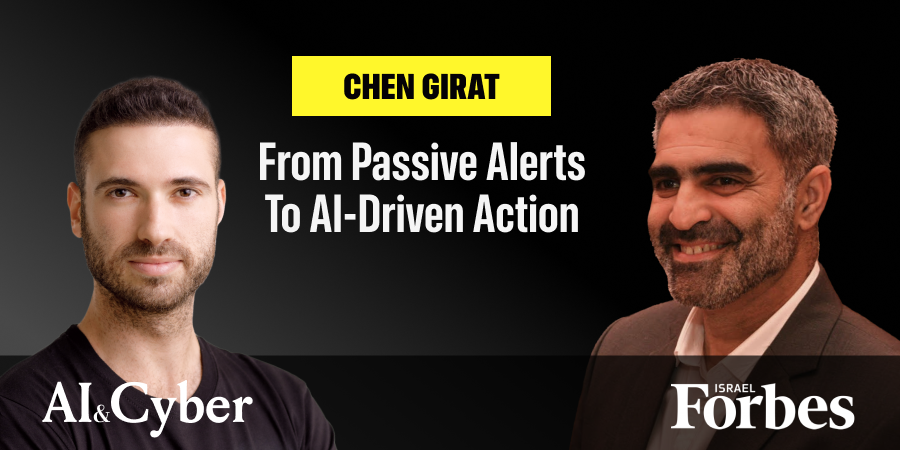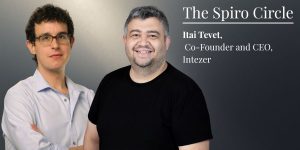Cybersecurity has long since moved beyond being an IT concern. In today’s AI-powered world, it’s a matter of national infrastructure, public safety, and geopolitical resilience. That reality was made sharply clear in my conversation with Chen Girat, the former Chief Information Security Officer of the Israel Electric Corporation. Chen’s career has taken him from the Prime Minister’s Office to one of Israel’s most critical infrastructure organizations, and throughout that journey he’s witnessed cybersecurity evolve from a tactical afterthought to a core pillar of national defense.
What struck me immediately in our conversation was how high the stakes have become. “If you don’t do your job right, it’s not the company that suffers—it’s the country,” Chen told me. This isn’t just about securing data or maintaining uptime. It’s about ensuring that power plants stay online, that communication networks don’t go dark, and that millions of people can live their lives uninterrupted. For critical infrastructure CISOs, failure isn’t an operational issue—it’s a strategic liability.
Chen made it clear that many of the old assumptions in cybersecurity no longer apply. “There is no perimeter anymore,” he said. The rise of distributed workforces, SaaS platforms, and cloud-native architectures has dissolved any meaningful boundary around the enterprise. Today, securing an organization means securing users, endpoints, APIs, and apps—wherever they are, however they connect. At Clarity, we’re seeing this firsthand as AI-powered impersonation and phishing threats proliferate. Identity has become the new battleground, and static defenses are no longer enough.
In this context, the role of the CISO is also undergoing a fundamental transformation. “The new model of the CISO is not just to say no—it’s to say yes, securely,” Chen explained. With the pace of business accelerating, and AI tools entering the enterprise at lightning speed, CISOs who can’t enable secure innovation risk becoming irrelevant. For Chen, staying relevant means one thing: partnering with startups. “There is no other way than startups,” he said—and I couldn’t agree more. We’ve seen how the best cyber innovation often comes not from incumbents, but from agile teams solving deep technical problems with urgency and focus.
But AI isn’t just accelerating innovation—it’s reshaping the threat landscape itself. “AI is a dual-use weapon,” Chen told me. “It allows attackers to generate code, run reconnaissance, and scale attacks in ways we’ve never seen before.” And the pace is only accelerating. Yet Chen doesn’t see that as cause for despair. Instead, it’s a call to action. “We’re developing AI to defend us from AI—it’s a battle of code against code.” In this world, detection isn’t enough. Response must be real-time. “We must shift from passive alerts to active, AI-driven intervention,” he said.
That mindset—of proactivity, of intelligence, of speed—is what defines modern cyber defense. It’s also what defines effective leadership. Chen is deeply aware that strategy alone isn’t enough; execution is everything. And one of the biggest execution bottlenecks in cybersecurity today? Talent. “We don’t have enough skilled people,” he said. So he built a pipeline. At the Israel Electric Corporation, Chen created an 8-month training program for people with no prior cybersecurity experience. The results were remarkable: highly motivated, mission-driven defenders trained from within. “You can teach the technology,” he said. “But the DNA those people bring with them? That lasts.”
It’s this kind of mindset shift—around people, technology, and execution—that cybersecurity so urgently needs. Because as Chen put it, “What excites me most is also what scares me most: how fast everything is changing.” That’s the paradox of cybersecurity in the AI era. We’re no longer just fighting threats—we’re managing systemic volatility. And yet, within that volatility lies an extraordinary opportunity: to move faster than the attacker, to train better than the adversary, to lead instead of follow.
That is the challenge—and the mandate—facing today’s generation of CISOs. And I believe we’re ready.
Michael Matias is the CEO and Co-Founder of Clarity, an AI-powered cybersecurity startup backed by venture capital firms including Bessemer Venture Partners and Walden Catalyst. Clarity develops advanced AI technologies protecting organizations from sophisticated phishing attacks and AI-generated social engineering threats, including deepfakes. Before founding Clarity, Matias studied Computer Science with a specialization in AI at Stanford University and led cybersecurity teams in Unit 8200 of the Israel Defense Forces. Forbes Israel recognized him early on, naming him to the exclusive 18Under18 list in 2013 and the Forbes 30Under30 list thereafter. Matias authored the book Age is Only an Int and hosts the podcast 20MinuteLeaders.





